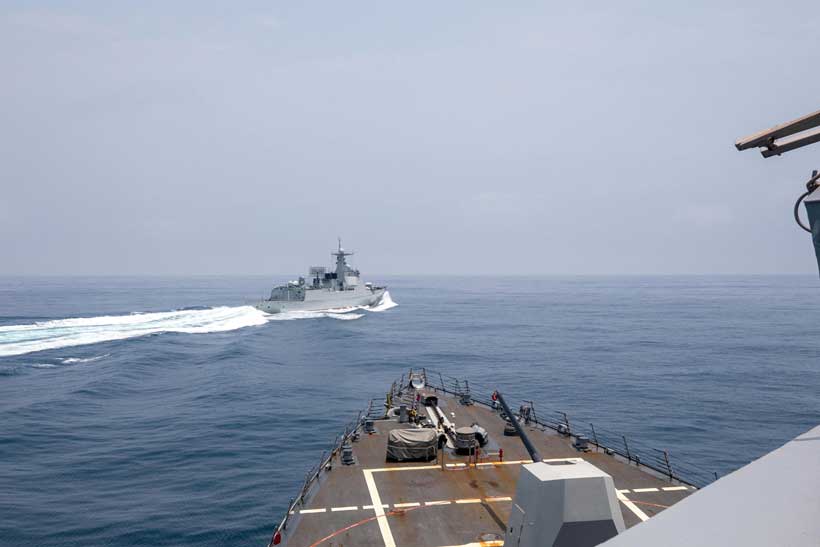On September 23, the Bureau of East Asian and Pacific Affairs under the Department of State published the United States’ Commitment to Maritime Security in the Indo-Pacific Fact sheet, announcing new U.S. funding for maritime security in the Indo-Pacific. The Fact sheet hardly refers to UNCLOS or other legal underpinnings that are essential to preserving maritime security, despite proudly stating its intention to “uphold the international law of the sea.”
A maritime security policy without a legal basis?
The fundamental framework for comprehending and preserving maritime security has been provided by legal analysis ever since the UN Convention on the Law of the Sea (UNCLOS) was adopted in 1982. However, the U.S. has yet to ratify UNCLOS. The topic of the United States’ non-membership in UNCLOS is not new and has been the subject of discussion for many years. It does, however, bring up a more general issue of how Washington’s strategy for maritime security still favors American interests while using international waters selectively in the name of upholding the international law of the sea.
Earlier this year, the White House issued the Executive Order “Unleashing America’s Offshore Critical Minerals and Resources” on April 24. This order makes it easier to facilitate licensing for the exploration and extraction of deep-sea minerals in areas beyond national jurisdiction under the Deep Seabed Hard Mineral Resources Act of 1980. The order might be used as a means for the United States to disregard current international frameworks and create new standards for deep-sea mining under domestic law. Because it is not a party to UNCLOS, the U.S. is unable to apply for deep-sea mining exploration licenses through the International Seabed Authority (ISA) or submit extended continental shelf claims to the Commission on the Limits of the Continental Shelf (CLCS). Together, this Executive Order and the new Fact sheet show how economic and strategic interests dominate the U.S. maritime security agenda.
Such an approach has a number of effects, including ignoring the international legal framework, increasing environmental risks, establishing unilateral norms, and strengthening the idea that the U.S. “plays by its own rules” while asserting that it upholds international law – a position that damages the credibility its allies and partners are trying to preserve.
Such inconsistency undermines U.S. credibility in global debates, giving China – frequently accused of unlawful actions – an opening to highlight Washington’s non-membership and unilateral stance.
Indo-Pacific’s Self-Appointed Maritime Police
The Fact sheet also outlines the U.S.’s broad goals to improve defense capabilities, assist the U.S. Coast Guard, and maritime law enforcement, and improve Maritime Domain Awareness (MDA). These actions highlight Washington’s desire to serve as a “gendarmerie” or regional police in strategic maritime areas such as the Indian Ocean, the East and South China Seas, and the Strait of Malacca. Bilateral and minilateral cooperation with allies and partners, such as South Korea, Japan, Vietnam, the Philippines, Indonesia, Malaysia, Pacific Island states, and South Asian maritime nations, is also envisaged in conjunction with these initiatives.
U.S. funding provides Southeast Asian countries with opportunities to protect sovereign rights, build maritime law enforcement capacity, and combat illegal fishing and trafficking. However, details remain scarce on how the funds will be allocated. This raises concerns about what compromises might be necessary, considering the Trump administration’s well-known transactional mindset, which frequently denounces allies as “free riders” who are expected to do more to share responsibility. Southeast Asian countries are increasingly diversifying their policy options despite China’s assertive actions. With the U.S. regional strategy still taking shape and offering little in the way of reliable signals, triggering or directly confronting China in the South China Sea does not appear to be a suitable choice.
U.S. funding for maritime security can be viewed as either a strategic enticement with possible conditions attached or as reassurance intended to rebuild trust, particularly if it runs the risk of increasing insecurity in disputed waters such as the East China Sea and South China Sea. Recently, Washington also released a formal statement regarding the China-Philippines Scarborough Reef incident. The timing of the Fact sheet and statement on Scarborough Reef seems deliberate, reinforcing U.S. alignment with regional allies and partners. Yet, beneath the surface lie unresolved contradictions, particularly if the U.S. continues to promote the law of the sea without fully committing to it.

